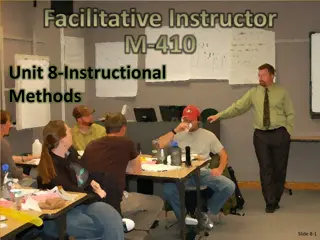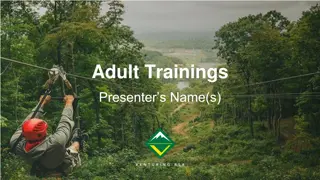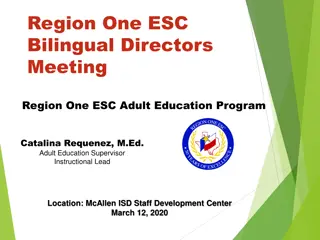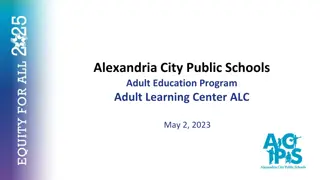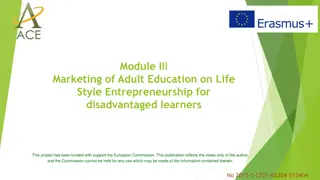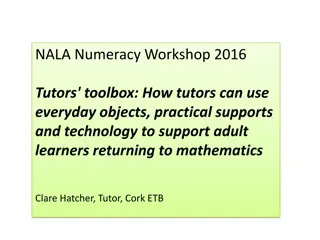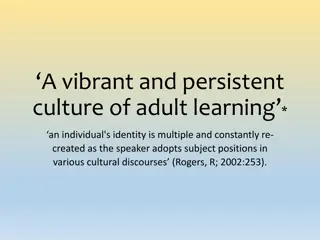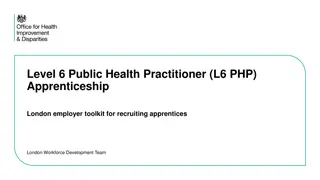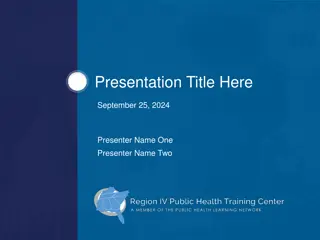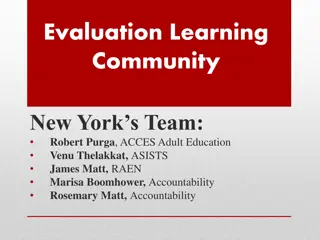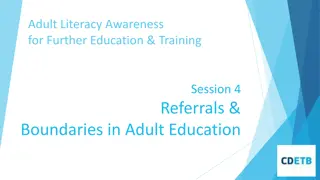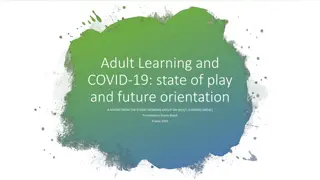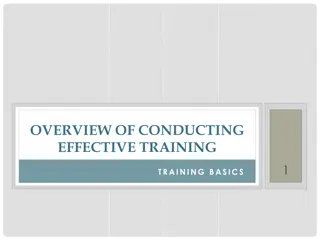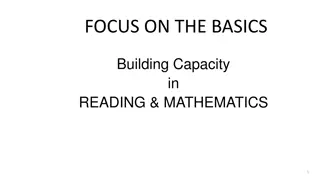Understanding Adult Learners in Public Health Training
This instructional module focuses on adult learning theory in public health training, exploring the characteristics of adult learners, the definition of learning, and the various processes and approaches used by adult learners. It delves into the domains of knowledge, skills, and attitudes, as well as the adult learning model and readiness to learn. Through a breakdown of definitions and visual aids, participants will gain insights into how adults learn best and how to design effective training programs for public health professionals.
Download Presentation

Please find below an Image/Link to download the presentation.
The content on the website is provided AS IS for your information and personal use only. It may not be sold, licensed, or shared on other websites without obtaining consent from the author. Download presentation by click this link. If you encounter any issues during the download, it is possible that the publisher has removed the file from their server.
E N D
Presentation Transcript
Instructional Training for the Public Health Professional THE ADULT LEARNER Module 2
Module Objectives By the end of this module, participants will understand the meaning of learning and apply the characteristics of the adult learner to adult learning theory. Explain the definition of learning Recognize the differences between the adult learner and the child learner Identify the various processes and approaches used by the adult learner 2-2 INSTRUCTIONAL TRAINING FOR THE PUBLIC HEALTH PROFESSIONAL
Learning is: knowledge skills a stable and persisting change in attitude 2-3 INSTRUCTIONAL TRAINING FOR THE PUBLIC HEALTH PROFESSIONAL
Breaking Down the Definition A steady and constant process where learners build on prior learning and create a scaffold that support future learning Stable Persisting a change that is not temporary an evolving process Change the act making or becoming different 2-4 INSTRUCTIONAL TRAINING FOR THE PUBLIC HEALTH PROFESSIONAL
The Knowledge Domain Creating Evaluating Analyzing Applying Understanding Remembering 2-5 INSTRUCTIONAL TRAINING FOR THE PUBLIC HEALTH PROFESSIONAL
The Skills Domain Adapting Practicing Imitating Observing 2-6 INSTRUCTIONAL TRAINING FOR THE PUBLIC HEALTH PROFESSIONAL
The Attitude Domain Internalizes Values Organizing Valuing Respond to Phenomena Receiving Phenomena 2-7 INSTRUCTIONAL TRAINING FOR THE PUBLIC HEALTH PROFESSIONAL
Adult Learning Model Self-Concept Level of Experience Need to Know Assumptions Motivation to Learn Readiness to Learn Learning Orientation 2-8 INSTRUCTIONAL TRAINING FOR THE PUBLIC HEALTH PROFESSIONAL
Readiness to Learn Describe a time where learning was desired: Activity Take five minutes to fill out the information requested. Space is provide in the manual. To fulfill a social role For curiosity or enjoyment To overcome a problem 2-9 INSTRUCTIONAL TRAINING FOR THE PUBLIC HEALTH PROFESSIONAL
Adult and Child Learning Differences Children Adults Self-Concept Level of Experience Readiness to Learn Dependent Inexperienced Related to human development phases Subject-centered Self-Directing Experienced Related to changing roles Life/Problem/Task centered Intrinsic Relevance Learning Orientation Motivation to Learn Need to Know Extrinsic Exploration 2-10 INSTRUCTIONAL TRAINING FOR THE PUBLIC HEALTH PROFESSIONAL
Sensory Learning Processes Visual Audio Kinesthetic 2-11 INSTRUCTIONAL TRAINING FOR THE PUBLIC HEALTH PROFESSIONAL
Visual Learning Process Prefer directions to be written Participants with the greatest facial expressions and pick up on facial expressions of others Prefer visual aids such as charts and illustrations during instruction Provide highlighters and allow space for notetaking on materials provided 2-12 INSTRUCTIONAL TRAINING FOR THE PUBLIC HEALTH PROFESSIONAL
Audio Learning Process Participants are good at remembering what they hear Participant may not read body language well Use questioning to draw out oral responses Prefer to have instructions read aloud Instructors should be aware of voice inflection and modify volume as a means of emphasis 2-13 INSTRUCTIONAL TRAINING FOR THE PUBLIC HEALTH PROFESSIONAL
Kinesthetic Learning Process Kinesthetic Learning Process Prefers hands-on activities to reinforce what is written or said May undertake tasks without reading or hearing directions Participants need frequent breaks and do not discourage standing during instructional periods Write out information during lecture Provide hands-on exercises to reinforce learning objectives 2-14 INSTRUCTIONAL TRAINING FOR THE PUBLIC HEALTH PROFESSIONAL
VAK Survey This survey is intended to identify your preferred method of learning. Fill out the provided survey and fill in the total of each section in your instructor manual. Activity Activity Take 10 to 15 minutes to fill out the survey. A brief discussion will follow the exercise. 2-15 INSTRUCTIONAL TRAINING FOR THE PUBLIC HEALTH PROFESSIONAL
Learning Approaches Problem Solving Competitive Collaborative Reflective Learners solve problem to reinforce learning objectives Form competitive atmosphere Games Learners encouraged to use their various skills to build a more complete team Individuals working apart from others Reflect on past experiences to reinforce learning objectives 2-16 INSTRUCTIONAL TRAINING FOR THE PUBLIC HEALTH PROFESSIONAL
Summary Understand the definition of learning Recognize the differences between the adult learner and the child learner Identify the various processes and approaches used by the adult learner 2-17 INSTRUCTIONAL TRAINING FOR THE PUBLIC HEALTH PROFESSIONAL
Coming Up Next Instructional Design and Strategies 2-18 INSTRUCTIONAL TRAINING FOR THE PUBLIC HEALTH PROFESSIONAL



